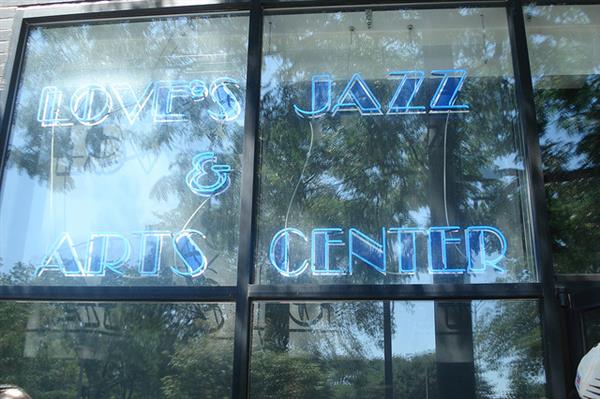Making Invisible Histories Visible
Page Navigation
- Making Invisible Histories Visible
- Lesson Plans and Resources
- iBooks on Omaha and Nebraska History for Primary Students
- Omaha Mapping Projects
-
African American Histories
- African American Artists
- African American Athletes & Facilities
- African American Churches
- African American Civil Rights Organizations - 1950s-1960s
- African American Civil Rights
- African American Contributions to Jazz, Gospel, Hip-Hop
- African American Dramatic Arts
- African American Education - Dorothy Eure & Lerlean Johnson
- African American Educators & Education
- African American Firefighters
- African American Homesteaders
- African American Law Enforcement
- African American Migration to Omaha
- African American Musicians of Omaha
- African American Newspapers
- African American Owned Businesses
- African American Politicians
- African American Social Life
- African American Workers at Omaha's Railroads & Stockyards
- African American Workers at the Naval Ammunition Depot in Hastings
- African Americans in the Civil War
- African Americans in Vietnam
- Charles B. Washington - Journalist and Civil Rights Leader
- Elizabeth Davis Pittman - Lawyer/Judge
- Green Book Omaha
- Marlin Briscoe - Professional Football Player
- Native Omaha Days
- Nebraska's Role in the Underground Railroad
- Sen. Edward Danner - Politician & Civil Rights Activist
- Sudanese Refugees
- Tuskegee Airmen
- European and Asian Immigrant Histories
-
Historic Neighborhoods & Buildings
- 24th and Binney/Wirt/Spencer Streets
- 24th and Lake Streets
- Central Park Neighborhood - 42nd and Grand Avenue
- Dahlman Neighborhood - 10th and Hickory Streets
- Hartman Addition Neighborhood - 16th and Williams Streets
- Indian Hills/Southside Terrace Neighborhood - 30th and Q Streets
- Jefferson Square Neighborhood - 16th and Chicago Streets
- Long Neighborhood - 24th and Clark Streets
- Orchard Hill Neighborhood - 40th and Hamilton Streets
- Smithfield Neighborhood - 24th and Ames Avenue
- St. Mary's Neighborhood - 30th and Q Streets
- Latino Histories
- Music Histories
-
Native American Histories
- Black Elk and John G. Niehardt
- Chief Standing Bear and Susette La Flesche Tibbles
- Dr. Susan LaFlesche Picotte - Native American Doctor
- Native American Education and Boarding Schools
- Native Americans in the Military
- Pre-statehood Interaction of Native Americans and Europeans
- Preserving Native American Tradition
- Restoring the Ponca Tribe
- The American Indian Movement in the 1960s and 1970s
- The Indian Congress at the 1898 Trans-Mississippi Exposition
- The Omaha Native American Indian Tribe
- OPS Elementary School History
- Redlining in Omaha
- Nebraska's Role in the Underground Railroad
- The 1898 Trans-Mississippi Exposition
African American Contributions to Jazz, Gospel, Hip-Hop
-
What do the three genres of music covered here - jazz, gospel, and hip hop - share in terms of common purpose in the lives of African Americans in Omaha?
Modern Music: A Journey from the Past to the Present
-
Music has had a significant impact on people throughout history and provides a soundtrack to their experiences. It has the remarkable ability to enhance history and tell the story of a people. The presence of music in Omaha has continued to help the African American community survive hardships like discrimination and segregation by acting as a source of encouragement and motivation to keep the fight for equal rights alive. It has given comfort when people are in pain and calm in times of stress. The presence of music has also amplified joy in happier times and fed the excitement during times of celebration.
When many people think about African American music in Omaha, the focus has been on jazz, but Black artists have made significant contributions to several music genres, including gospel, R&B, and hip-hop. As the popularity of African American music grows, many artists' musical contributions work to unite people from different communities and walks of life by giving voice to people that are sometimes seen as invisible in the city. African American music in Omaha not only reflects the identity of the people but works to shape it as well.
An 8 minute video produced in 2012 interviewing Phyllis Hicks and Llana Smith about the churches' role in African American life and the importance of music and an interview with Houston Alexander about the history of Hip-Hop in Omaha.
Jazz Arts Center
Preston Love Sr.
-
Preston Love Sr. remains one of the most well-known and respected jazz musicians in Omaha. He played the saxophone with some of the world’s greatest jazz musicians, including Count Basie, Miles Davis, Ray Charles, Ike and Tina Turner, Marvin Gaye, and B.B. King. Later in his career, Love became the head music director for Motown Records. Although he traveled extensively during his music career, he held a dominant place in the Omaha music scene. Love also maintained a column in the Omaha World-Herald during the later years of his career and hosted a radio show on KIOS-FM. When Preston Love passed in 2004 at the age of 82, the city lost a true music legend. Love’s life and legacy continue to cast a long shadow within the local Black community as a source of pride and inspiration in a new round of urban revitalization. Love’s Jazz and Art Center, an important cultural center at 24th and Lake streets, is named for him and public art memorializes his many achievements and works to reinforce his commitment to nurturing musicianship in Omaha.
Gospel Journey
-
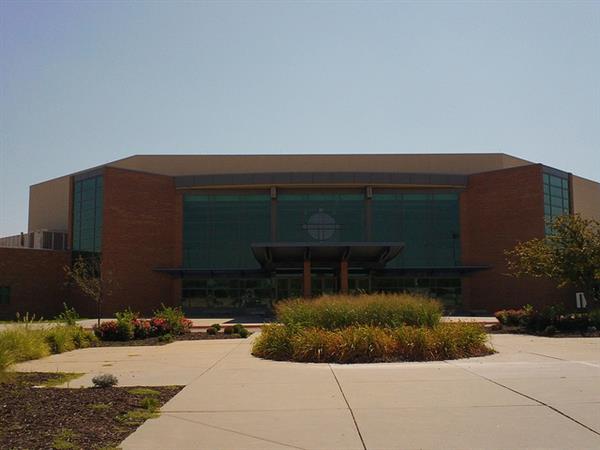
Gospel music and the Black church have been powerful parts of the African American community. Gospel music evolved out of traditional spirituals and hymns during the Great Migration. It has served as a powerful source of comfort, strength, and inspiration within the Black church, reinterpreting prophetic religious stories in a new context. While North Omaha is home to dozens of African American churches, Salem Baptist Church, located at 31st and Lake streets, is the largest Black church in the state. A key part of Salem’s popularity is due to its dynamic music programs. The church also has been a local gospel innovator, incorporating choreography and featuring several instruments like drums and the electric guitar. Salem Baptist Church’s Inspirational Choir, founded in 1951 by Rev. J.C. Wade, achieved national recognition in 1978 when they collaborated with James Cleveland and received a Grammy Award nomination for the song “I Don’t Feel No Ways Tired: James Cleveland presents the Salem Inspirational Choir.” Although they lost, the album went gold, selling more than 500,000 copies. Their achievements help to validate the quality of music found here in Omaha.
Hip-Hop in Omaha
-
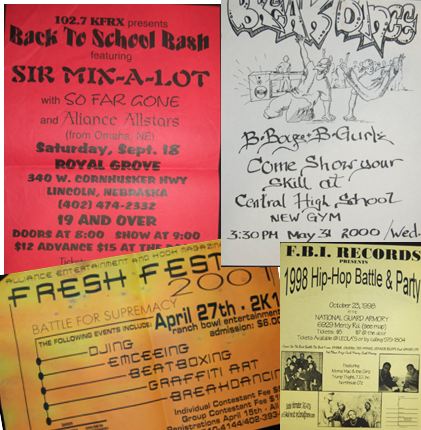
Hip-Hop is a genre of music started by African American youth in the New York area that intermingled jazz, reggae, soul, gospel, and R&B. It has been credited with giving a voice to the disenfranchised and young people in Omaha jumped at the chance to tell their stories in a new way by exploring hip-hop culture. During the 1980s, people like D.J. Mario Scratch and D.J. Suicide helped popularize hip-hop culture, which includes rap, break dancing, and graffiti art. There were numerous venues that hosted talent shows where local, regional, and even national artists showcased their talents in the 1990s and early 2000s. However, over time, the availability of such venues dwindled and many performers now connect with their fans through the internet and social media. In 2012, the most popular venues for listening to live hip-hop music are the Sokol Auditorium off 13th and Martha streets, and the Waiting Room Lounge on 62nd and Maple. Also, local hip-hop historian Houston Alexander promotes local hip-hop artists by playing their music on his radio program “Power Mix Sunday Night”, airing on 106.9 FM.
African Americans on the Radio
-
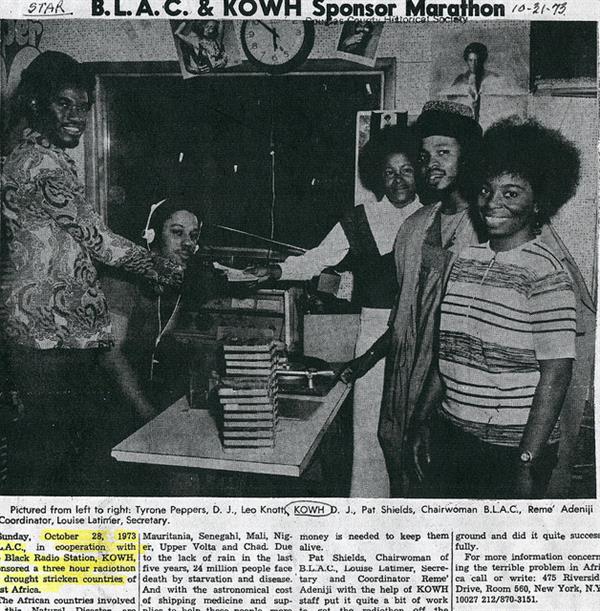
One of the important dynamics in popularizing and sharing African American music within and beyond the community has been the use of radio. In the early 1970s, hometown sports legends Bob Boozer and Bob Gibson, in coordination with Reconciliation Inc. and other community organizations like the Wesley House, started the first Black radio station in the city, KOWH. Although popular with the African American community, its existence was short-lived due to an inability to turn a profit. Many other African American radio stations since then have also struggled to find success and remain on-air due to opposition from Whites, discriminatory practices, failure to obtain advertisers and/or lack of sufficient community support. However, as the mainstream popularity of Black music like hip-hop and R&B grew regionally, nationally, and globally throughout the 1980s and 1990s, African American artists found increasing playtime on the radio dial.
In 2012, several Omaha radio stations featured African American artists in heavy rotation. There are also a few African American formatted stations, like “The One” 1090-AM, a black urban talk radio station, and power 106.9 FM, a devoted hip-hop, R&B, and Pop station. (Photo courtesy of the Douglas County Historical Society-Omaha Star 1973)
Additional Information
-
The 2012 MIHV students learned more about the rich musical history of the African American community in Omaha. The 2012 project picked up where the music group of 2010 left off with a closer look at Omaha jazz legend Preston Love Sr. whose work in the community helped bridge the music gap across generations. Love’s Jazz and Art Center, opened in 2005, and in 2012 continued to help educate people, both young and old, on the importance of music and other arts to the African American community.
Another important individual in music education in Omaha was Professor Charles L. Miller. Miller worked to educate young people in Omaha from the 1970s until his unfortunate death in 2011. His efforts inspired many to get involved in the music industry and create popular local bands like ETC, R-Style, Destiny, and Poverty’s Movement Band, among several others. He received several awards for his dedication to the young people in Omaha. Miller also published A Bridge to Success, “One Man’s Vision Changed the Lives of Many”, chronicling his life and his efforts to help at-risk youth in Omaha achieve success in music and in life. In the book, Miller states, “My vision was; any student can be helped, no matter what conditions their lives are in.”
Several other successful members of the music industry have roots in Omaha. One notable musician from Omaha was Buddy Miles (1947-2008). As a drummer and singer, he worked with many great artists, like Jimi Hendrix and Stevie Wonder. Miles was inducted into the Nebraska Music Hall of Fame in 2004. Another Omaha native who has had a significant impact on the national music scene is Terry Lewis, who was born in Omaha in 1956. He has produced for numerous R&B and pop stars, including Janet Jackson. Cathy Hughes, born in Omaha in 1947, became a pioneer in radio and entertainment by starting both Radio One and T.V. One. Both radio and television stations cater to African Americans.
2012 MIHV Project
-
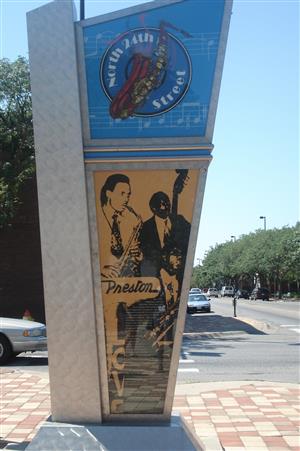
Preston Love Memorial, located on 24th and Lake Street.
Student Reflections
-
"This camp has taught me many new things about North Omaha I will never forget."
- Isice J.
"The camp brought all of us together as a family, to bring back wonderful history that hasn't been heard."- Lisset J.
"What I learned from this week was that music can be positive or negative, and it's up to us to choose which kind of music we want to listen to."- Devron R.
Resources
-
Alexander, Houston. Personal interview. 18 July 2012.
Cieciora, Mike. "Teaching the Roots: Hip-Hop as a Culture-not a Product." The Reader [Omaha] 1 May 2003, Issue 10.09 ed.: 10-12. Print.
Hicks, Phyllis, and Llana Smith. Personal interview. 16 July 2012.
Jack, Tom. "The Omaha Gospel Complex in Historical Perspective." African Americans on the Great Plains: An Anthology. By Bruce Glasrud and Charles Braithwaite. Lincoln: University of Nebraska, 2009. 320-38. Print.
Miller, Charles Lott. A Bridge to Success: One Man's Vision Changed the Lives of Many. S.l.: S.n., 2010. Print.
"Professor Charles L. Miller Receive Top Honors from Mayors of Two Cities." Sealottmusic. N.p., 19 July 2011. Web. 12 July 2012.
Sanders, Jean. "PROFILE: Catherine Hughes." PROFILE: Catherine Hughes. NSEA, 2008. Web. 12 July 2012.
Special Thanks:
Douglas County Historical Society
The Omaha Star
Houston Alexander
Phyllis Hicks
Llana Smith
Research compiled by: Devron R., Lisset J., & Isice J.

